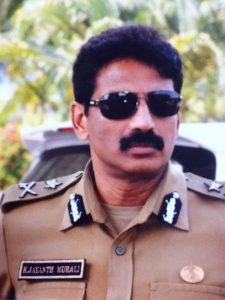In the line of Khaki Psychache: Problem of Police Suicides and Simple Strategies for its Prevention

In Chennai, Constable Mr Arun Raj of Armed Reserve, and Sub Inspector Mr Satish Kumar of Ayanavaram Police station, who blew their brains with their guns recently in two separate incidents, should have felt something akin to a 9/11 situation of being trapped and engulfed in a towering inferno of a gradually collapsing Multi-storey building, with the fire menacingly catching up with them and the blaze beginning to caress their backs. They are faced with two options – to jump out of the window, and die instantaneously or be burnt excruciatingly to the bitter end, as in the proverbial hell ? Death by jumping obviously seems a less painful way out. So they haul themselves out of the window. That’s precisely what, suicide is. A person committing suicide, finds exiting this world by killing oneself, less painful and easy, when compared to the agony and heartache, of fighting the demonic fires raging and ravaging ones personal or professional life, in this mundane earthly plane.
India has earned the sobriquet of the ‘Suicide capital‘ of the world from the World Health Organization [WHO]. India accounts for nearly a third of the global total, with the number of suicides here being twice as much as China, which is second on the list. It also has the highest rate of suicides among young people, in the age range of 15 to 29 years. Among the states, Tamilnadu and Kerala had the highest suicide rates per 100,000 people in 2012. The male to female suicide ratio was around 2:1.
As far as the police is concerned, Tamilnadu has the highest number of suicides by police personnel among the Indian states. According to a report published in 2016, 166 police personnel in Tamilnadu, ended their lives between 2010 and 2014 followed by 161 in Maharashtra and 61 in Kerala. In a recent report published by National Crime Records Bureau (NCRB), suicides in the age group of 15 and 29 years accounted for 34.4 percent and the age group between 30 and 44 years accounted for 33.8 percent. The most worrisome fact being that about 70 percent of suicides in the uniformed services too, are committed by persons below the age of 44 years, imposing a huge social, economic and emotional burden on society.
The most probable precipitating factor connected with police suicide appears to be stress. Stress and policing, effects officers and their families. A severe form of stress, known as, traumatic stress-appears to be predominant in police work, and possibly plays a part in suicide. While, ailments like PTSD (Post Traumatic Stress Disorder) are increasingly acknowledged within the armed forces, its prevalence in civilian police goes totally unnoticed.
Law enforcement is one of the most toxic, acerbic career fields under the sun. Police personnel put their lives on the line daily, they are always being called to situations that individuals would never want to deal with, such as murder, violence, accidents, and disasters. Rotational shifts, long hours, and exposure to life’s catastrophes, exact a heavy toll on police personnel and their families. Poor working conditions, heavy workload, poor infrastructure including substandard equipment, poor police image, confrontation with the populace and the media on a daily basis, rigid police hierarchy, lack of job satisfaction and meager pay, not only complicate but compound the stress in one’s work life, impacting family life as well. As a result high divorce rates, suicides, domestic violence, heart attacks, cancer, depression, and alcoholism are invariably the unfavorable outcomes amidst police personnel and their families.
The public and the media foster a macho image of the police personnel, often portraying their mythical ability to withstand trauma and violence without any suffering and ill effects, but the truth is however to the contrary. When police personnel are subjected to stresses over an extended period, their ability to cope becomes difficult. Police men and women as a group, tend not to cope well with psychological angst, they are often found to have maladaptive coping strategies. It’s this coping disability which causes the police personnel to break easily, and contemplate suicide, much more easily, when things get unbearable.
Psychologists reckon that majority of the police personnel working in the field are either suffering from underlying depression or anxiety. Depression is a silent killer in the police force, exacting a psychosomatic toll on the mind and body of even the most resilient police officer. Most police men and women who are depressed are in denial regarding their condition, as the police sub-culture unfortunately, promotes silence. Besides, police officers do not want to be seen as weak. Speaking out plainly about one’s problems in the police department, is generally never encouraged and mostly stifled. So if they are suffering from depression, or any other mental illness, they are extremely unlikely to get help. Most are also wary of seeking any type of professional assistance. This can prove harmful to police personnel in many ways, and turns into a Catch 22 situation for her/him. The reaction of colleagues, when a policeman is discovered to be psychologically unfit for duty, is generally not one of compassion and solidarity, in stark contrast, the stigma of being branded by subordinates, superiors, or police management as possibly unstable or having a psychological issue may cause other staff to shun or not be willing to work with such person. The other consequences of being put on leave, reassigned to desk duty, having his gun taken away from him, the fear of being passed up for promotions makes the future seem even more scary and bleak. So the great majority of depressed police brethren, do nothing, and remain at a high risk for suicide. In the final analysis, a stressful job with untreated depression and a service gun at hand, is a extremely deadly mix. As police personnel are armed with a gun, a fatal suicide method is always readily available. Hence, more, police officers die by their own hand than are killed in the line of duty.
Police leaders and supervisors must become conversant with depression, because it affects such high percentage of police personnel, especially when depression is linked with a significant risk of suicide. The symptoms of clinical depression include a decline in energy levels or increased fatigue and a loss of the ability to participate in enjoyable activities. A good Police Supervisor, would easily be able to recognize these symptoms, as portentous clues, and draw an inference that the person needs help. A feeling of sadness, worry, and desperation tends to dominate a depressed police mans thoughts. Asking for emotional help in a time of crisis is not weakness. It should not be held against any person – who desires to discuss issues that are bothering him. Emotional issues should never be repressed. The greatest prevention of depression apparently is a ridicule free work ecosystem, where policemen can admit freely and share easily, in case they have had a rainy day, when life hurts, or whenever they are psychologically bruised from the confrontation with the public or by the abuses hurled at them by their superiors. Law enforcement officials must be allowed to, feel free, to seek talk therapy, hospitalization or medical management, without any fear of reprisal or being looked upon as emotionally weak.
Policemen need to be told that depression is common, it is treatable and there is no shame in being depressed. Police officers and men during training should be made aware of the emotional toll of depression on police work and must be taught coping techniques. Police men/officers should also be compulsorily required to undergo a thorough check-up periodically with a therapist who is adept at dealing with stress and trauma in just about the same way they get an annual medical examination. Training should be imparted to policemen in suicide awareness, not only to understand their feelings, but also identify and understand the feelings of persons vulnerable to suicide, and to cope with emotional adversities. Practice of theoretical psychological assessment, tracking high-risk police men, training the supervisors to recognize signs of suicide proneness and preparation of suicide prevention strategies for police organisations must be made obligatory.
A daily regimen of exercise and relaxation techniques is necessary to take on stress proactively in the life of policemen and women. Exercise is a great stress buster, it helps prevent chronic diseases such as blood pressure and depression. If other cities and states in our country, are also able to switch over to a compact eight hour schedule, for the lower echelons as was done by Mumbai Police in January this year, it would free up precious time for police personnel to take up more stress relieving activities or help Police leadership incorporate more physical movement into their lives, by reviving the practice of parade and physical training, which is facing neglect or has become almost defunct in the police stations due to exponential increase in law and order duties. This would not only improve discipline but also go a long way in combating depression and stress. Exercise has the added benefit of releasing endorphins, a great mood elevator. Every policemen/women might have played some sport or game or practiced yoga sometime in his/her life. Reviving his/her interest or encouraging him/her to pursue a new sport can also help matters, a great deal by merging it in their work schedules.
The next big deal is laughter. “Laughter being the best medicine ‘is not to be treated as a cliche’. Children laugh about 300 times a day while adults laugh only 15 to hundred times per day. Laughing helps ease stress. And laughing hundred times equals 10 minutes of training oneself on a rowing machine or 15 minutes of cycling. To make policemen laugh is very difficult, as looking stern and tough is what their job demands. Punjab Armed Police recently has embarked upon laughter Yoga program for its constables at its training center to make them stress free. The cops laugh their heart out, which fills them with a sense of calm and relaxation. They are also told to begin their day by looking into the mirror and start laughing at themselves in order to feel good and energized throughout the day. A similar laughter therapy session, before or after the roll call could help police personnel kick-start their day in a cheery and positive frame of mind.
Practicing meditation and breathing makes one more resilient to stress. But an average policeman finds it difficult to sit and meditate, or practice breathing or mindfulness as it feels majorly cumbersome to him/her. Any police personnel caught up in the frantic pace of the modern world can reap the benefits of meditation by chanting mantras to achieve relaxation and reduction of stress. Chanting is an easy, effective way to still the chatter of the mind and experience bliss. This prescription is found in all the scriptures of the world. Here is a sample from our Purana.
“Whatever is achieved in Satya-yuga by meditation, in Treta by offering ritual sacrifices and in the Dvapara by temple worship is achieved in
Kali-yuga by chanting the names of Lord Kesava.”
(Padma Purana, Uttara Khanda 42nd Chapter)
When a policeman’s outer world is cacophonous and disharmonious, that discordant vibration will configure, his inner cosmos. Conversely, inner turbulence, manifests as a psychotic outer world. Chanting mantra, shifts this process and creates a more symphonic inner world which then harmonizes his outer world. Police personnel of different faiths can have their own mantras. A Hindu might chant Om, while a Christian might find solace in the mantra “Jesus have mercy on me “and a Muslim May chant “Allah ho Akbar”. There can be no better prescription for stress and depression, than the prescription of chanting. A policeman can do it any time-while patrolling, while on guard duty, while on bandobust duty, or on any other duty – and experience bliss, harmony with his spiritual self, even while being engaged with the physical world.
Quite often it is noticed that loss of purpose and meaning in one’s life may also force a policeman/woman to resort to the extreme step of taking his/her life. Many police personnel find it overwhelming to re-create purpose in life. Suicidal ideation in such individuals is preventable by providing proper guidance, good counsel and mentor ship services. The missing purpose and meaning in policeman’s life can be rekindled by helping them associate with their favorite cause, by renewed interest in their children and family, participation in volunteer services or by adoption of a pet.
To wrap it up, here’s a small story highlighting the power of purpose to save a soul which had totally lost all hope in this world.
“A policeman was preparing to die. He loaded his revolver, and slowly, started to raise it to his head. Just before, he could pull the trigger. The door opened slowly. And his dog walked in. He abruptly stopped. Gradually, lowering the loaded revolver down, he pondered, “What will happen to my poor little dog after I die?” Seconds away from a suicide, the policeman opted not to die”
Source from: epaper/chennai/deccanchronicle/dt:19.05.18 & 21.05.2018
 Dr.K. Jayanth Murali is an IPS Officer belonging to 1991 batch. He is borne on Tamil Nadu cadre. He lives with his family in Chennai, India. He is currently serving the Government of Tamil Nadu as Additional Director General of Police, CB CID.
Dr.K. Jayanth Murali is an IPS Officer belonging to 1991 batch. He is borne on Tamil Nadu cadre. He lives with his family in Chennai, India. He is currently serving the Government of Tamil Nadu as Additional Director General of Police, CB CID.


